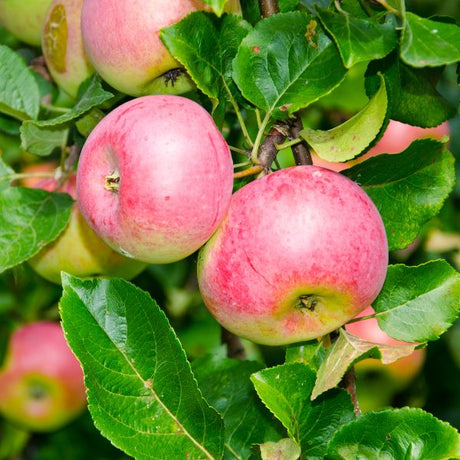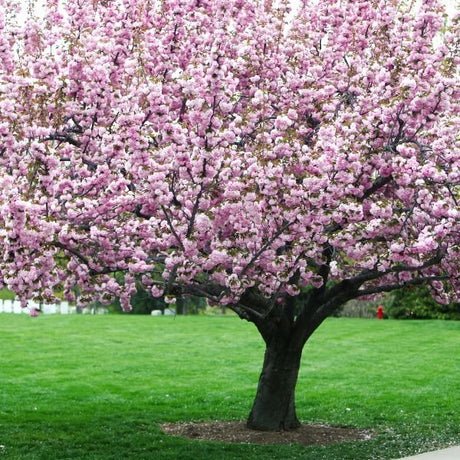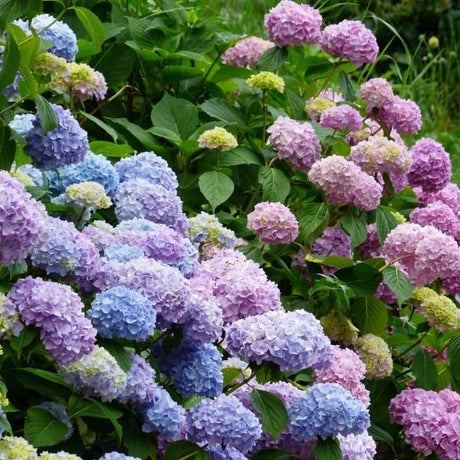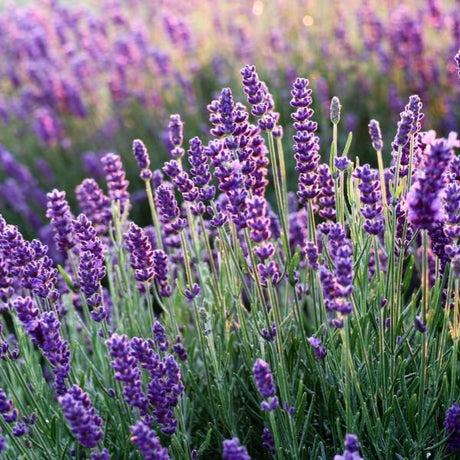California Honey Mandarin Tree
Citrus x reticulata 'California Honey'
- Stay Protected with Plant Sentry ™
California Honey Mandarin Tree - #3 Container 2-3 Feet is backordered and will ship as soon as it is back in stock.
Plant Sentry™
Plant Sentry™
Plant Sentry is designed to protect both consumers and the nursery trade from invasive plant pests and diseases. Sites that display the Plant Sentry protection badge are protected from consumers buying and nurseries shipping material carrying invasive pests and diseases.
This proprietary eCommerce software prevents the shipment of a restricted plant to each state. The Plant Sentry system includes a shipment certification program. The Plant Sentry Compliance Officer works closely with NatureHills.com and each nursery or fulfillment center to ensure only compliant plants are sold to customers.
Click Here to learn more

Delivery and Shipping
Delivery and Shipping
Shipping
To obtain a more accurate shipment time-frame, simply enter your zip code in the “Find Your Growing Zone” box to the right. Our plants are grown all over the country and lead time on items may be different because of this. Once your order is placed, you will also receive the specific shipment time-frame information as part of your order confirmation. Once an item ships, you will receive shipment notification and tracking numbers, so you can follow along while your plant travels to your doorstep. We use FedEx, UPS, or USPS at our discretion.
Due to winter weather we have put a hold on shipping to the areas shown below in grey. You can still order now and we will ship the plant to you during an appropriate time for your zone.
Standard Shipping Rates
At Nature Hills we handle, package and ship the products you order with the utmost care to ensure healthy delivery. Shipping and handling charges are calculated based on the tables below. Please note that some items include an additional handling surcharge, these will be noted on the item's product page.
| From | To | S&H |
|---|---|---|
| $0 | $19.99 | $24.99 |
| $20 | $49.99 | $29.99 |
| $50 | $69.99 | $34.99 |
| $70 | $99.99 | $39.99 |
| $100 | $129.99 | $44.99 |
| $130 | $149.99 | $48.99 |
| $150 | $150+ | Approx 28% |
Click here to see our full rates
Understanding Plant Options
Nature Hills offers plants in two main formats:
- Container Plants: Grown in pots with soil, sized by container volume and plant age
- Bare Root Plants: Dormant plants without soil, sized by height measurements
Container Plant Sizes
Container sizes indicate plant age and growing capacity rather than liquid volume equivalents. Our containers follow industry-standard nursery "trade gallon" specifications, which differ from standard liquid gallon measurements.
Young Plants (6 months to 18 months old)
| Container Size | Actual Volume | Metric Equivalent |
|---|---|---|
| 2" x 2" x 3" | 0.18 - 0.21 dry quarts | 0.20 - 0.23 dry liters |
| 4" Container | 0.31 - 0.87 dry quarts | 0.35 - 0.96 dry liters |
| 4.5" Container | 0.65 dry quarts | 0.72 dry liters |
| 6" Container | 1.4 dry quarts | 1.59 dry liters |
| 1 Quart | 1 dry quart | 1.1 dry liters |
| 5.5" Container | 1.89 dry quarts | 2.08 dry liters |
Established Plants (18 months to 2.5 years old)
| Container Size | Actual Volume | Metric Equivalent |
|---|---|---|
| 2 Quart | 2 dry quarts | 2.2 dry liters |
| #1 Container | 2.26 - 3.73 dry quarts | 2.49 - 4.11 dry liters |
| 5" x 5" x 12" | 3.5 - 4.3 dry quarts | 3.85 - 4.74 dry liters |
Mature Plants (2-4 years old)
| Container Size | Actual Volume | Metric Equivalent |
|---|---|---|
| #2 Container | 1.19 - 1.76 dry gallons | 5.24 - 7.75 dry liters |
| #3 Container | 2.15 - 2.76 dry gallons | 8.14 - 12.16 dry liters |
Large Plants (3-5 years old)
| Container Size | Actual Volume | Metric Equivalent |
|---|---|---|
| #5 Container | 2.92 - 4.62 dry gallons | 12.86 - 20.35 dry liters |
| #6 Container | 5.25 - 6.01 dry gallons | 23.12 - 26.42 dry liters |
| #7 Container | 5.98 - 6.53 dry gallons | 26.34 - 28.76 dry liters |
Bare Root Plants
Bare root plants are sold by height from the root system to the top of the plant. Plants may exceed minimum height requirements.
Common Sizes:
- Trees: 1 foot, 2 feet, 3 feet, 4 feet, 5 feet, 6 feet
- Shrubs & Perennials: 1 foot, 18 inches, 2 feet
Important Notes
Container Volume Specifications
- Trade Gallon Standard: Our containers follow industry-standard "trade gallon" specifications established by the American National Standards Institute (ANSI Z60.1) for nursery stock
- Volume Variations: Actual soil volume may vary due to plant root systems and growing medium settlement
- Age Indicators: Container size primarily indicates plant age and maturity rather than liquid volume equivalents
Growing Conditions
- Plant size can vary based on variety and growing conditions
- Container size helps indicate plant maturity and establishment level
- Larger containers generally mean more established root systems and faster landscape establishment
Seasonal Availability
- Bare root plants are available seasonally when dormant
- Container plants are available throughout the growing season
- Specific varieties may have limited availability in certain sizes
Questions?
For questions about specific plant sizes or availability, please contact our plant experts who can help you choose the right size for your landscape needs.
Plant Highlights
California Honey Mandarin Tree highlights at a glance!
Specifications
Specifications
-
Brand
-
Botanical Name
-
Growing Zones
-
Mature Height
-
Mature Spread
-
Sun ExposureFull Sun
-
Moisture
-
Soil
-
Growth RateMedium
-
Flower Color
-
Fall Color
-
Pollinator Friendly
-
Pollinator Required
-
Fragrant
-
Pruning Time
-
Bloom PeriodLate Spring
-
Harvest Time
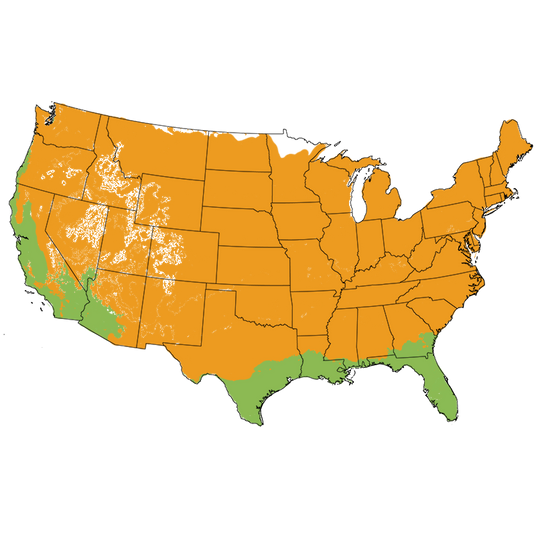
Growing Zones 9-10 (patio 4-10)
There is a reason that they call this tree 'Honey'. Of all of the Mandarins, the California Honey Mandarin Tree (Citrus x reticulata 'California Honey') consistently ranks as the best tasting and smelling of all the Mandarin and Tangerine trees available!
You won't find the California Honey in your local grocery store. The fruits are on the small side and have more seeds than commercial industries like. Their loss is your gain, though! One taste of this and you'll be spoiled from any store-bought fruit again! This Citrus is very juicy and tastes like spiced honey.
The fragrant white flowers emerge in late spring and produce delicious fruit that ripens from November through April. The shrubby trees have dark willowy leaves and are beautiful on their own, with or without fruit!
Planting and Application:
These are perfect ornamental landscaping trees, retaining their evergreen foliage year-round, you'll also enjoy the scented blooms and dangling gems. We're certain a grouping or privacy hedgerow of these trees will turn heads! A single tree-form specimen will quickly become a drool-worthy addition to your edible landscaping. While shrub forms offer screening and definition.
If you live in a colder climate, simply plant them in a container. Bring your tree indoors near a sunny window, and let the intoxicating citrus scent brighten your home during cold winter days.
- Prolific Producer
- Honey Spiced Taste
- Fragrant
- Grow Indoors & Out
- Specimen, Hedgerow or Container Tree
#ProPlantTips for Care:
Citrus Trees prefer full sun and fertile, very well-drained soil conditions. It requires a moderate amount of watering, preferring to dry out slightly between waterings. If you will be growing it in the ground, please ensure it has good drainage. If you see puddles long after a rain, you'll want to build a raised bed 12 to 18 inches high and 3 feet square.
In colder climates, this tree growing in a container must be moved indoors for winter. Give it the brightest light you can and maintain moderate humidity to produce fruit successfully. Keep it in a greenhouse or attached sunroom is best.
Citrus is an acid-loving plant and prefers acid soils with a pH of 6 to 6.5. Fertilize with Dr. Earth Acid Lovers Organic and Natural Premium Fertilizer. For best results, apply twice a year in the ground, once in the spring and once again in the late winter. A well-fed Citrus tree is better prepared to tolerate cold temperatures through the fall and winter months. For containers, apply fertilizer every 3 months.
A single tree will produce fruit, but we recommend planting at least two for the largest fruit set.
Protecting Container Citrus From Cold
If you're growing these tropical trees in the ground in the lowest of their favored growing zones, they need to be planted in a sheltered spot to avoid the worst of the chill. If a spot like that is unavailable then you are better off planting in a large, deep container.
This Citrus variety naturally grows successfully in marginal Citrus areas (USDA zones 8 to 4). But Citrus trees grown in these zones should be grown in containers and brought indoors before the wintertime.
In cooler growing zones, begin slowly acclimating your tree indoors in the early fall or moving them into a protected location, eventually moving your tree inside in bright indirect sun for the winter if the temperatures in your area ever dip below that 40°F range.
In spring, reverse this process and begin acclimating your tree to again be back out in the full sun all summer. This reduces stress and leaf drop.
Like all of our Citrus, these trees are a minimum of three years old, have extensive branching, and have some of the largest root systems available. We take pride in delivering you the highest quality citrus trees with healthy roots and full, well-established stems and foliage.
- Maintain at any size best for your needs with some simple Pruning
- Full sun, low moisture needs once established - let dry out some between waterings
- Provide regular fertilizer
- Slightly acidic soil that's enriched & well-drained
- Learn about Caring for your Citrus Tree in our Garden Blog
For the sweetest most flavorful Mandarin on the market, you'll be glad you didn't wait and got yourself or that special someone this beautiful tree! Order a California Honey Mandarin Tree now at NatureHills.com before they sell out and enjoy the benefits of growing your own Citrus fruit anywhere in the U.S.!





